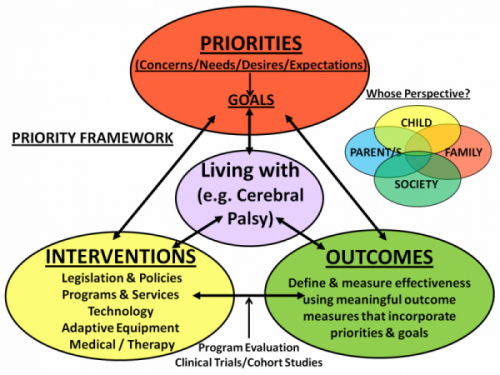PSCORE Research Program
Our research program aims to:
- Understand priorities of patients and parents, explore their role in goal setting and clinical decision making;
- Incorporate these priorities and goals in the development and validation of meaningful patient reported outcome measures for musculoskeletal conditions; and
- Apply these outcome measures in clinical trials and cohort studies to evaluate the effectiveness of interventions for these conditions.
1. Understand patient priorities
Our work has led to the development of a Framework of Patient Priorities (Figure 1) that links the concepts of priorities (concerns, desires and expectations) and goals that arise from the patient’s lived experiences, with interventions to address these priorities and goals, and outcome measures that evaluate the effectiveness of these interventions to specifically the goals for which they were intended.
We have used this framework to define the priorities of patients with adolescent idiopathic scoliosis; and chronic neurologic conditions such as cerebral palsy (both ambulatory and non-ambulatory) and muscular dystrophy; congenital, developmental and acquired lower limb deformities; and skeletal trauma.
Fig 1. Framework of patient priorities
2. Development and validation of patient-reported outcome measures
We have completed or are continuing work on the development and validation of several patient and parent-reported outcome measures that explicitly incorporate the priorities and goals of families that arise from their experience living with a chronic condition. Validated outcome measures include the CPCHILD™, GOAL™ and GOAL-LD™. Outcome measures currently under development include the Muscular Dystrophy Child Health Index of Life with a Disability (MDCHILD™), a new outcome measure for children with progressive neuromuscular conditions such as Duchene’s Muscular Dystrophy, and the Patient Reported Outcome Measure for Fractures (PROOF™), a tool for evaluating outcomes of upper and lower extremity fractures in children. To learn more, please visit the Outcome Measures page.
3. Evaluation of clinical interventions through clinical trials and cohort studies
Children with chronic disability can undergo major health interventions to improve their mobility, comfort or quality of life. Many of these interventions are resource-intensive and expensive. It is our aim to understand the benefit of different interventions using outcome measures that are developed specifically for children with chronic conditions. To learn more, please visit the Projects page.


